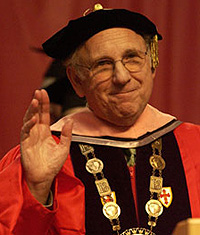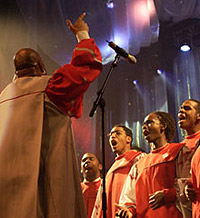Dreams and Responsibilities
President Lee Eliot Berk joins the class of 2004 in waving goodbye to Berklee.
Commencement 2004 was Lee Eliot Berk's last, after 25 years as president. Photo by Phil Farnsworth
More than 700 students graduated from Berklee last weekend, but one degree recipient's work extends back not four years, but 38: President Lee Eliot Berk. After serving as president since 1979, he is retiring at the end of this month. Just before students received their diplomas on Saturday, President Berk was thanked for his monumental contributions with an honorary doctor of music degree, a distinction he received alongside of fellow honoree, entertainer Bill Cosby.
"Lee Berk has been the best kind of visionary," said Executive Vice President Gary Burton, who is also retiring this year. "Whatever the issue, you could always count on Lee to be one step ahead and do the right thing for the college...Looking back it all seems so logical, but at each step of the way, when decisions were being made, it took great thinking and a lot of commitment to get us where we are today."
The Berklee that the president is about to leave is a world away from the one-room school his father Lawrence Berk founded in 1945. Under President Berk's leadership, the college has expanded its campus from one building to 17, more than doubled its enrollment, elevated the perception of contemporary music as an educational pursuit, and established itself as a trailblazer in creating academic programs in music technology, music business, and music therapy. Berk has also spearheaded an extensive outreach program, one that has brought more women and minorities to the college and made Berklee into one of the most international of U.S. colleges, with over 25 percent of its students hailing from more than 70 countries.
"It's really gratifying to see how I've helped to carry forward my father's vision," said President Berk in an address he gave after receiving his degree. "To have continued the entrepreneurial history of the college with new majors, new technologies, community and international outreach, and to have seen so many of our alumni continue to receive the highest level of recognition from the music industry and beyond."
Berk began his speech by acknowledging the work his wife Susan Berk has done on behalf of the college, and announcing that both of his daughters are pursuing careers in education. For nearly 60 years, the Berk family has guided the college, and for the first time in its history, someone from outside the family will lead the college. Beginning June 1, Berklee's third president, Roger H. Brown will take office.
President Berk and his father have long enjoyed reputations as leaders who were able to find ways of turning dreams into realities. So much so, that a long list of industry giants—including vocalist Tony Bennett, producer and composer Quincy Jones '51, producer Arif Mardin '61, and producer Phil Ramone—wrote letters expressing their gratitude and appreciation of Lee Berk's accomplishments.
According to Cosby, who gave the commencement address, confidence and being true to oneself are the keys to achieving goals. During a 27-minute speech that at times was deeply serious and at other times hilarious, Cosby told the story of his early successes and failures as a stand-up comedian, emphasizing in particular a night in 1963 when he lost his confidence just before a gig.
"You're graduating. Doesn't mean a damn thing. Doesn't mean a damn thing unless you show up each and every time," said Cosby, who removed his gown and delivered his speech in a Berklee sweatshirt and sweatpants. "When you go for an audition, you show up. Not the doubting person, not the unprepared person, not the one that you send with excuses, not the one who is hoping people will just rescue them. You show up. That is what today is about."
Graduating senior Clare McLeod struck a similar chord when she delivered the student speech, an address that proved that musicianship and oratory skills are not necessarily mutually exclusive. "We have a purpose beyond simply lasting as long as we can," said McLeod, a professional music major. "Life is also movement through time, and it is our responsibility to imbue our lives with our passion, to make our movement rich with beauty."
The commencement concert on the prior evening provided many examples of how Berklee-trained musicians have learned to put all of themselves into their art.
Vocalist Kamaria Ousley and the Berklee Jazz/Rock Ensemble (JRE) performed a fiery version of the Beatles' "We Can Work It Out" in a soulful, r&b style that made it sound as if it would have fit perfectly onto Stevie Wonder's Songs in the Key of Life. After the JRE performed four songs, it gave way to Phil Wilson's Rainbow Band, the first change of musical settings on a night filled with them. For 40 years, the Rainbow Band has been one of the college's most accomplished large jazz groups, and Wilson called the 2004 version "as good as any band I've had in 40 years." After performing the Wilson composition "The Future's in Your Hands," the Rainbow Band tackled an arrangement of "Cherokee" written by graduating senior Tsunenori "Lee" Abe, whose vocal quartet, Syncopation, sang the leads.
The JRE returned next with former faculty member Al Kooper's "I Love You More Than You'll Ever Know," a bluesy soul ballad featuring the powerful lead vocals of Daniel McCLain. After the group performed a four-tune medley of television themes associated with Bill Cosby, it was time for the night's third band to appear, a small combo of students, faculty, and alumni, led by bassist Abraham Laboriel Sr. '72, one of the most sought-after studio musicians in the world.
Dennis Montgomery III leads the Reverence Gospel Choir. Photo by Phil Farnsworth
"I have a very special love for this school, for this institution, for what it stands for, and for all the people that are going through it," said Laboriel, after interrupting his solo bass introduction on his first tune. "Everything that Berklee's about is just people that love music and that have chosen to love one another through music."
Laboriel then continued with the tune, a love song written by his father; followed that up with one of his own compositions; and then performed an improvised duet with his son and guitarist Mateo, also a Berklee graduate. The Laboriel group, which included students Rafael Alcala and Jordan Perlson on piano and drums, and faculty percussionist Eguie Castrillo, took a sharp turn when it was joined by vocalist Lalah Hathaway '90, who remained for the rest of their set. In just a few minutes, she demonstrated a voice of extraordinary versatility and depth. First came the urban soul hit, "Street Life," and then a version of "Summertime" that turned it inside out in a way it's never been performed before. Hathaway, Laboriel, and Castrillo performed it as a trio and changed the oft-covered standard into a slow funk-jazz ballad.
The final group of the night was the Reverence Gospel Ensemble, directed by faculty member Dennis Montgomery III. The two-song set ended with a tune cowritten by Montgomery and Kooper called "Musical Fortress: The Lee Berk Song." There are probably few colleges presidents who have received as rousing and personalized a musical send-off. In the hands of the 55-student gospel group, the words "Lee Berk" went from being the name of a hard-working, unassuming man to one of the catchiest gospel refrains you'll ever hear.
Lee Eliot Berk has led the effort to make Berklee a home for musicians in pursuit of their dreams. His legacy is found in the accomplishments of 25 years of graduates, the men and women who now perform, produce, compose, manage, and heal in musical environments all over the world. There's a college and now a song named for him, but what Lee Berk truly represents is the boldest era yet in contemporary music education.
On March 24, 2016, the college's Board of Trustees announced that it had voted to rescind Bill Cosby's honorary degree.

